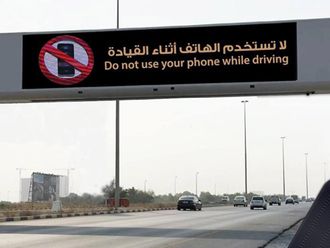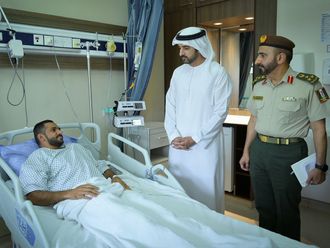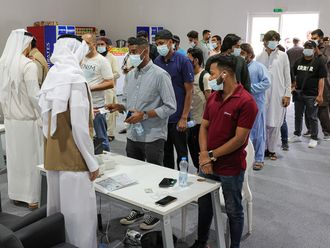
Dubai A pharmacy in a mall which reported brisk sales of blood pressure monitors during the Eid break highlights a growing public awareness about the need to remain clued in about one's own health.
"People come to Dubai for Eid from other [GCC] countries and our sales [of hand-held monitors] was good," says Jaisho P.C., pharmacist at Boots.
Blood glucose monitors for diabetics had also been in high demand, he said.
"Home-care is the latest trend in prevention of chronic diseases or for proper maintenance of your treatment through regular monitoring," says Dr Prem Jagyasi, CEO of ExHealth, a health care events management firm.
In today's fast-paced world, it is not always possible to go to a hospital or a clinic to keep track of one's blood sugar level or check for hypertension, Dr Jagyasi said highlighting why more people are relying on hand-held monitors.
"The days of just measuring your height and weight are gone," he said. "Stroke patients or the aged can now wear a device which immediately notifies a relative, friend or a doctor if the person falls down or has an accident at home," he said.
Regular monitoring
The doctor believes that because of the sedentary and stressful lifestyles of people, it is essential to regularly check BP, blood sugar, and BMI (body mass index) levels.
Some doctors are of the opinion that frequent checking of your blood pressure can actually be counter-productive and hike the pressure. People often do not know when is the right time to check their blood pressure, a doctor said.
Marianne Zaida who is pregnant, finds a portable blood glucose monitor very handy. Her doctor has advised her to check her blood sugar levels every day as pregnant women run a risk of gestational diabetes.
She said she checks her blood sugar in the morning before breakfast, in the afternoon and after dinner. "It's not practical for me to go to a lab three times a day," she says.
A pharmacist at an outlet in Safa said pharmacies were allowed to check the blood pressure or blood glucose of customers earlier. "The Ministry of Health stopped it a few months ago," he said.
"Pharmacists would charge about Dh5 to check your BP," he said. He was not sure about the reason for the ban but believes that the pharmacists could have been using expired strips to check blood sugar. "The blood pressure results are not always accurate from these monitors," he said.
But Elia Sayegh from Bayer Healthcare, says self-montoring is an integral part of your treatment, which includes medicine, exercise and diet. "It is the only element that shows how your food and exercise are acting on your body. You need to know the ups and downs [of blood sugar levels] on a daily basis," he said.
According to Dr Fadi Shomal of Cardiocheck, hand-held monitors for checking lipid profile (cholesterol), are also best-sellers. "It's a very helpful device and you get the results fast. It's much cheaper than a lab."
He adds: "Many people do not know they are sick. They do not know they have high [bad] cholesterol. They do not know they have high BP and they do not know they are diabetic," he said. "We need to create more awareness,' said the doctor.
Elia Sayegh of Bayer concurs: "Unlike in Europe, people in the UAE and the Middle East are not health conscious. That is why the Ministry of Health and manufacturers seek to create awareness [such as the diabetes campaign recently]."
Check-list: Chance of inaccurate readings
- While it is easier for many people to use wrist blood pressure monitors, doctors and experts say that readings at the wrist can be inaccurate if the device is not positioned properly.
- Some doctors are of the opinion that frequent checking of your blood pressure can actually be counter-productive and hike the pressure. People often do not know when is the right time to check their blood pressure, a doctor said.
- Getting your BP checked can actually save your life as high blood pressure (the silent killer) can cause a heart attack or a stroke.
- A digital monitor is easier to use than the aneroid unit. It has a gauge and stethoscope in one unit, and the numbers are easy to read. It also has an error indicator, and deflation is automatic.
- The disadvantage of the digital monitor is that the accuracy is affected by body movements or an irregular heart rate. It also requires batteries.
- Some models of digital monitors are designed for use with the left arm only and make them hard for some patients to use. Some digital monitors are quite expensive.
Do you own a hand held monitor? How many times a day do you use it? Do you find it more convenient then going to the hospital to have your levels checked?












